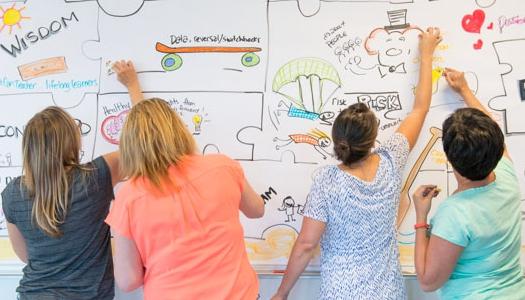Academically turbo-charged summer camp for teachers

I am in the midst of a bit of culture-shock, the likes of which I haven’t experienced since coming home from summer camp when I was a teenager. I have just returned home from the campus of Royal Roads University where I completed the residency component of the Master of Arts in Educational Leadership.Going into residency, I sort of expected it to be like summer camp. The campus, nestled in the woods on the coast of Vancouver Island, is a lot like the setting of the summer camp I attended when I was growing up. Like at summer camp, the schedule was packed and somehow the days were long but the weeks were short. I lived on campus on the same residence floor as most of my classmates and quickly made friends with people I had only met on-line in the weeks preceding residency.
Of course I also expected the residency to be like my days as a student. I dug my pencil case out of the bottom of the drawer and stocked it with pens, pencils, index cards and sticky notes. I had done the assigned readings and had pored over the preliminary assignment. It hadn’t been that long since I was last a student, and even though I was expecting a challenge, I felt ready.
While I was prepared for the rigour, I wasn’t prepared for the intensity, nor the speed with which one deadline followed another. Poring over assignments, or mulling over ideas until they coalesced into something coherent wasn’t really an option when the deadlines were separated by hours rather than days. This was high-pressure and rapid-fire and that was hard to take (you can get a feel for my reaction to being assessed in a previous post).
Just before the mid-point of the residency, I had a paradigm shift. I realised that this was neither summer camp, nor a return to my university days. This was boot-camp. Merriam-Webster defines boot camp as follows:
'a short but very difficult training program : a program or situation that helps people become much better at doing something in a short period of time.'
While our schedule included introductory course work, a lot of time was devoted to basic training in things like collaborative skills, research skills and academic writing skills. There were times when it felt like the professors were more like drill sergeants than teachers, especially when it came to the mechanics of writing in accordance with the (dreaded) APA publication manual. The physical setting, once a military college, fit the metaphor; there was even a block in my closet where I could store a rifle. Intimidating as it might sound, thinking of my experience as boot-camp was actually helpful. It made sense of the fact that the experience wasn’t quite like any previous experience, and it okay to feel uncomfortable all the time.
Ironically, with a new guiding metaphor for the experience, the second week started to feel like summer camp again. With a few assignments under my belt, I felt a bit more confident about the ones on the horizon. As I put the new skills to use, they started to feel more natural and, most importantly, I started to get comfortable with the discomfort.
By the time the two weeks came to a close, it felt even more like summer camp. We had a collection of inside jokes that wouldn’t be funny to anyone else and we had taken endless innumerable photos in an attempt to capture the sights and memories of the experience. There were thoughtful reflections and tearful goodbyes. Even our professors, once more like drill sergeants, seemed sad to see us go.
Looking back, both the summer camp side of the experience, and the boot-camp side of it served a useful purpose. Having been through some good times and some tough challenges together, we are both united and prepared for the rest of the journey.
To read more please visit my blog.